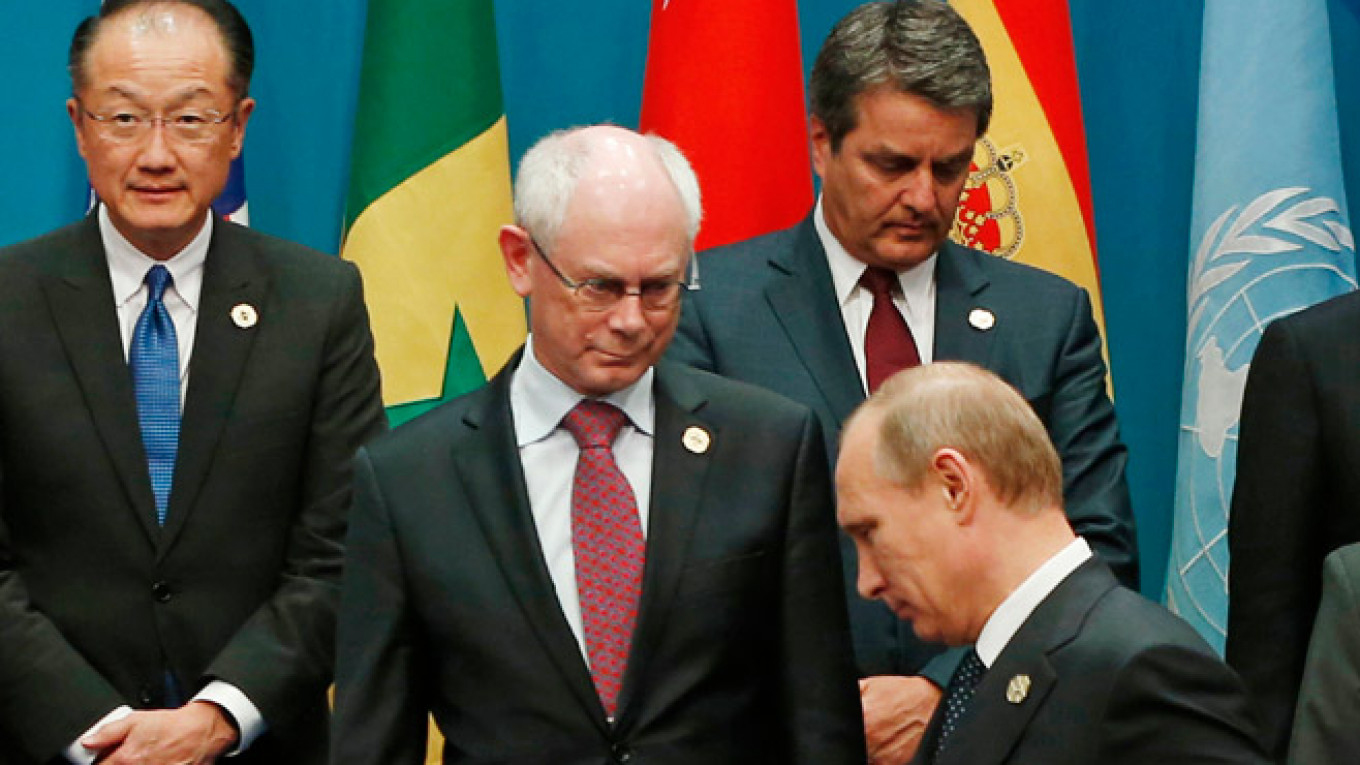Moscow's annexation of Crimea and its perceived intervention in the eastern Ukraine conflict have led to it being hit with several rounds of Western sanctions. More are in the pipeline, with the United States and Europe developing a sanctions regime with multiple gears that can be engaged in response to Russia's actions.
The targets of these sanctions are varied: Individuals have been hit with travel bans and have seen their assets frozen; banks and companies with close ties to the Kremlin have seen their access to longer term finance restricted; and sales have been restricted to parts of the economy, including the high-tech, military and oil sectors. Two questions arise: Are sanctions having an impact on the Russian economy? And are they working to moderate Russian behavior?
It is important to note that Western sanctions have been calibrated to avoid crashing the Russian economy while imparting gradual, long-term pain.
If the West wanted to cause more immediate damage, Iran-style sanctions could have been imposed — including blanket bans on any business with Russian entities and restrictions on the use of transaction and clearing services and credit cards.
These would have caused huge capital flight, put extreme pressure on the ruble and rapidly depleted Russia's foreign exchange reserves, causing potentially systemic losses throughout the economy. They would have also damaged the global economy.
Sanctions are not designed to bring about regime change in Russia, but to change the behavior of President Vladimir Putin's government. The concern is that regime change could herald an even more anti-Western administration in the Kremlin.
Given such constraints, sanctions appear to have made an already difficult economic environment in Russia more challenging, and forced Russian economic policymakers to act in ways they may otherwise have avoided. The Russian economy had been expected to grow at a rate of 1 or 2 percent this year. Expectations are now for not much more than 0.5 percent real growth in gross domestic product this year, and perhaps a small negative number next year.
Capital flight, a key indicator of confidence, has doubled over the past six months, from a trend rate of about $50 billion to about $100 billion. The Russian Central Bank has lost $90 billion in foreign exchange reserves so far this year in propping up the ruble.
This defense has largely failed, as the ruble has lost close to a third of its value, though part of this decline is related to lower oil prices. Meanwhile, sanctions have effectively shut the bulk of Russian borrowers out of Western capital markets, limiting access to dollar and euro financing. This is critically important for key sectors such as energy that urgently need investment.
So the effect of sanctions, combined with other losses associated with the conflict in Ukraine, is having a painful impact on the Russian economy, estimated at $100 billion a year. But have the sanctions changed the course of Russia's actions in Ukraine?
On their own, they are not likely to. But they do appear to have added to the costs associated with Russia's actions in Ukraine. Russian official commentary in the aftermath of the annexation of Crimea suggests that the Kremlin was not expecting Western sanctions. The fact that the U.S. moved quickly to impose sanctions surprised the Russian establishment and appears to have made them pause to reassess the risk of further sanctions.
It was this pause that seems to have bought the Ukrainian military time to regroup and led to some military success, including at Slovyansk in July, checking further expansion of separatist forces across the Donbass and beyond. The tables were turned in September, after a large Russian military intervention, which led to the current stalemate.
Timothy Ash is head of emerging market research for Standard Bank, London. A version of this article was originally published in The World Today, Chatham House's bimonthly magazine.
A Message from The Moscow Times:
Dear readers,
We are facing unprecedented challenges. Russia's Prosecutor General's Office has designated The Moscow Times as an "undesirable" organization, criminalizing our work and putting our staff at risk of prosecution. This follows our earlier unjust labeling as a "foreign agent."
These actions are direct attempts to silence independent journalism in Russia. The authorities claim our work "discredits the decisions of the Russian leadership." We see things differently: we strive to provide accurate, unbiased reporting on Russia.
We, the journalists of The Moscow Times, refuse to be silenced. But to continue our work, we need your help.
Your support, no matter how small, makes a world of difference. If you can, please support us monthly starting from just $2. It's quick to set up, and every contribution makes a significant impact.
By supporting The Moscow Times, you're defending open, independent journalism in the face of repression. Thank you for standing with us.
Remind me later.






